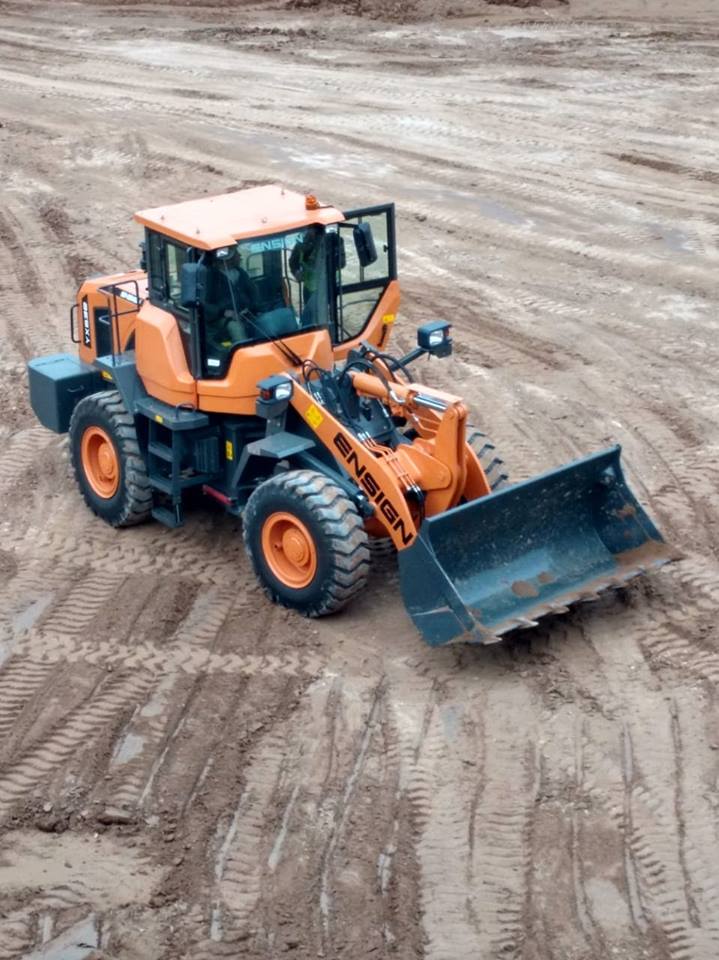Service Tel:
+86-536-6298882
Email:
export@ensignhi.com
ADD:
No.1567, ENSIGN Street , Economic Development
Zone, Changle,Weifang, Shandong, China
© Ensign Heavy Industries Co., Ltd. all rights reserved
鲁ICP备12026776号-3 鲁ICP备12026776号
Make Time for Wheel Loader Maintenance
Operators know they're supposed to do preventive maintenance (PM) every day to keep a wheel loader in peak operating condition. Yet, how will they get all that dirt moved by the end of the day if they take extra time to check fluid levels, tires, grease points, etc.?

It can be tempting to skimp on these tasks to gain a few extra minutes and stay on schedule. But if you give in to that temptation and bypass daily service checks, you could end up short-changing the performance of your machine and, in the end, you may actually get less done.
"Use of recommended maintenance practices is paramount to the well being of the product," says Frank Hepner, senior product service engineer, Caterpillar. "Extensive testing has been performed on various components to determine maintenance intervals and filter requirements."
Consult the manual
As with other earthmoving machines, wheel loaders call for a simple daily maintenance routine to be set up and implemented. "Ideally, it should be performed by the operator at the start of the day," says Nick Rogers, product specialist, Liebherr. "This should begin with a check of the fluid levels (hydraulic oil, engine oil and fuel) and end with a walk-around of the machine."
While most loader models will have the same general rule of thumb as to when certain tasks should be completed, you should check the operator's manual for your specific machine since slight variations may exist. Many manufacturers also may post service intervals on stickers affixed directly to the machine and located in an easily identifiable spot, such as the door.
"Some contractors overlook the operator's manual," says Dave Pooley, Hyundai, "but that's a mistake. The operator's manual is a great source of reference. If you don't consult the manual, you can miss out on changes that have been made to the maintenance schedule since the last time you purchased a new machine."
For example, with the move to Tier III engines, many manufacturers upped some fluid change intervals. "If you haven't read the manual, you might not be aware of that change," Pooley says. "That means you could be missing out on some big savings. Since you don't need to change the fluids as often, you won't need to purchase as much product."
While this scenario isn't harmful to the machine's operation, other items that you miss could be. "It is extremely important to read and follow the manufacturer's recommended maintenance intervals," says Rogers. "These intervals have been designed to provide the most productive and efficient longevity of the machine."
For example, if you don't check filters, debris can impede the flow of air, oil, etc. "For air filtration, you want the filter to be free of clogs and dirt so you can get optimum performance out of your engine," says Bryan Evans, Doosan Infracore America, Corp. "And a clean filter reduces fuel consumption."
Many manufacturers now include a hydraulic reversible fan to blow out rear coolers. "Be sure to use it," says Evans. "It can help minimize overheating conditions with an engine."
And while bypass valves enable fluids to flow to their intended component even if the fluid filter is clogged, that lubrication will be done with a dirty product. This can lead to early wear, and eventually component failure.
When you extend fluid change intervals beyond recommendations, you sacrifice the product's ability to do its job to the best of its ability. Consider that it's not just the oil that can break down. "Fluids are really a package," says Pooley. "There are specific additives that can break down and lose their protective qualities. If the manufacturer suggests that oil be changed at 500 hours, it won't offer the same protective qualities beyond that time period."
Pooley also advises sticking with manufacturers' recommended lubricants, and implementing an oil analysis program that can alert you to increasing wear or potential component failure. "Choosing a good brand of oils and filters is important," he says. "Most manufacturers will provide a list of recommended products. Following this recommendation is especially important if the machine is new enough to be under warranty. If you don't, the manufacturer may not honor [the warranty] if something goes wrong."
Operators know they're supposed to do preventive maintenance (PM) every day to keep a wheel loader in peak operating condition. Yet, how will they get all that dirt moved by the end of the day if they take extra time to check fluid levels, tires, grease points, etc.?
It can be tempting to skimp on these tasks to gain a few extra minutes and stay on schedule. But if you give in to that temptation and bypass daily service checks, you could end up short-changing the performance of your machine and, in the end, you may actually get less done.
"Use of recommended maintenance practices is paramount to the well being of the product," says Frank Hepner, "Extensive testing has been performed on various components to determine maintenance intervals and filter requirements."
Consult the manual
As with other earthmoving machines, wheel loaders call for a simple daily maintenance routine to be set up and implemented. "Ideally, it should be performed by the operator at the start of the day," says Nick Rogers, product specialist, Liebherr. "This should begin with a check of the fluid levels (hydraulic oil, engine oil and fuel) and end with a walk-around of the machine."
While most loader models will have the same general rule of thumb as to when certain tasks should be completed, you should check the operator's manual for your specific machine since slight variations may exist. Many manufacturers also may post service intervals on stickers affixed directly to the machine and located in an easily identifiable spot, such as the door.
"Some contractors overlook the operator's manual," says Dave Pooley, "but that's a mistake. The operator's manual is a great source of reference. If you don't consult the manual, you can miss out on changes that have been made to the maintenance schedule since the last time you purchased a new machine."
For example, with the move to Tier III engines, many manufacturers upped some fluid change intervals. "If you haven't read the manual, you might not be aware of that change," Pooley says. "That means you could be missing out on some big savings. Since you don't need to change the fluids as often, you won't need to purchase as much product."
While this scenario isn't harmful to the machine's operation, other items that you miss could be. "It is extremely important to read and follow the manufacturer's recommended maintenance intervals," says Rogers. "These intervals have been designed to provide the most productive and efficient longevity of the machine."
For example, if you don't check filters, debris can impede the flow of air, oil, etc. "For air filtration, you want the filter to be free of clogs and dirt so you can get optimum performance out of your engine," says Bryan Evans, "And a clean filter reduces fuel consumption."
Many manufacturers now include a hydraulic reversible fan to blow out rear coolers. "Be sure to use it," says Evans. "It can help minimize overheating conditions with an engine."
And while bypass valves enable fluids to flow to their intended component even if the fluid filter is clogged, that lubrication will be done with a dirty product. This can lead to early wear, and eventually component failure.
When you extend fluid change intervals beyond recommendations, you sacrifice the product's ability to do its job to the best of its ability. Consider that it's not just the oil that can break down. "Fluids are really a package," says Pooley. "There are specific additives that can break down and lose their protective qualities. If the manufacturer suggests that oil be changed at 500 hours, it won't offer the same protective qualities beyond that time period."
Pooley also advises sticking with manufacturers' recommended lubricants, and implementing an oil analysis program that can alert you to increasing wear or potential component failure. "Choosing a good brand of oils and filters is important," he says. "Most manufacturers will provide a list of recommended products. Following this recommendation is especially important if the machine is new enough to be under warranty. If you don't, the manufacturer may not honor [the warranty] if something goes wrong."
Extra care for harsh conditions
If you operate wheel loaders in extremely harsh environments, or in multiple shifts, adjust the maintenance schedule accordingly.
"Any high-production, demolition, waste treatment or other jobsite could potentially shorten a loader's life in operation if proper maintenance... is not performed," says Rogers. "Contractors should always perform the maintenance intervals as recommended, and always make sure the machine matches the operation and weight of material being handled."
With that being said, there are ways in which operators can perform a certain task that will help extend the longevity of the loader and, in the long run, keep it operating in peak condition over the long haul.
For example, make sure operators come to a complete stop before shifting gears. "If you don't, you could damage the transmission, axles, etc.," says Evans. "The operator's method of operation can result in damage to the machine. Encourage operators to treat the loader with respect."
Take time to evaluate a jobsite, adds Pooley. Experienced operators can assess jobsite conditions and adjust their approach to it accordingly. "When approaching a pile of material you intend on moving, consider what it is," says Pooley. "Sand and dirt will be easy to move compared to recycled asphalt that has been in a pile for a while. Once it sets for an extended period of time, it rebonds and becomes difficult to move."
Also equip the loader with the right tools for the job, including buckets, bucket teeth, tires, etc. "You should use a different bucket for moving soil, sand or gravel than one that you would use in a rock quarry," says Pooley. "In a rock quarry, you wouldn't be able to penetrate the pile with a flat bucket. But with a spade nose bucket, the point penetrates first and makes rock loading easier. The right bucket for the job will get more done in the long run."
Pay attention to tires, as well. "They're in constant contact with the ground, so you need to ensure they are inflated with the proper air pressure," says Evans. "If air pressure is not maintained, you lose stability on the machine, especially on the front." This can put both the operator and the loader at risk.
Evans adds, "If one tire's inflation pressure is considerably lower than another, your bucket or ground-engaging tool won't be level. Plus, with a low tire on one side, you have more torque and friction on that side, which is hard on the mechanical components of the machine, such as axles and brakes."
Overall, taking care of your wheel loader will add life to the machine, and value when it comes time to trade it in or sell it. "I can't stress enough the importance of following a routine PM schedule. Don't deviate from it," says Evans. "And if you have a record of maintenance performed, it can add 15% to 20% to the value of the machine at trade-in."
Service TEL:
400-066-1567
ADD:
1567 Yingxuan Street, Changle Economic Development Zone, Weifang, Shandong, China
Copyright © Ensign Heavy all rights reserved
鲁ICP备12026776号















